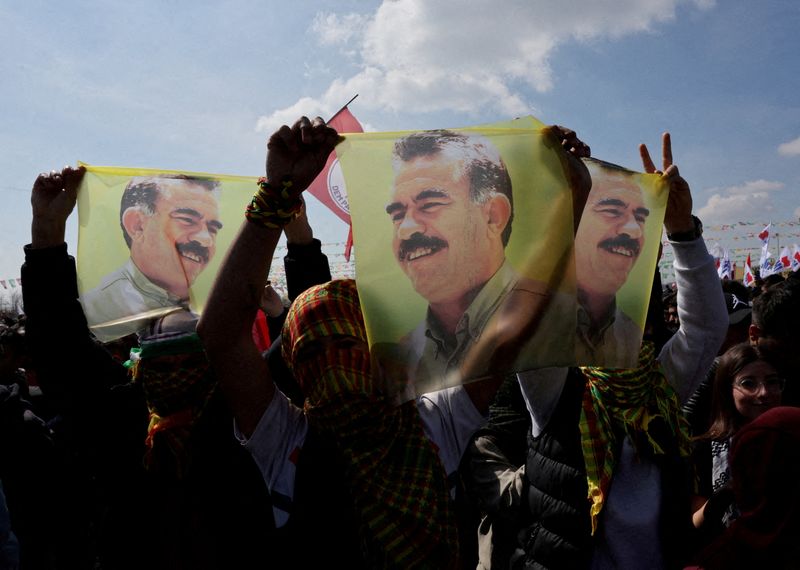Jailed Kurdish militant leader Ocalan back in spotlight in Turkey
2024.10.24 09:33
By Daren Butler
ISTANBUL (Reuters) – Kurdish militant leader Abdullah Ocalan, jailed 25 years ago, is again a focus of attention in Turkey after President Tayyip Erdogan’s nationalist ally raised the possibility of his release in exchange for ending his group’s decades-long insurgency.
Devlet Bahceli, leader of the Nationalist Movement Party (MHP), made the surprise suggestion on Tuesday in a speech to MHP lawmakers following recent media speculation about fresh efforts to end a conflict that Ocalan launched 40 years ago.
It was not immediately clear whether an attack at the headquarters of the Turkish Aerospace Industries in Ankara on Wednesday in which five people were killed and 22 others injured would affect or even derail the MHP overture to Ocalan.
Turkey’s government has blamed Ocalan’s Kurdistan Workers Party (PKK) for Wednesday’s attack, in which the two armed assailants were also killed.
The PKK took up arms against the Turkish state in 1984 with the aim of carving out an ethnic homeland for Kurds in Turkey’s southeast. The four-decade insurgency has killed tens of thousands of people, re-shaped Turkish politics and scarred towns and cities across the southeast.
Ocalan was captured in Kenya by Turkish special forces in 1999 and has now spent a quarter of a century in an island prison south of Istanbul.
For many of those years he has continued to wield considerable clout, but it is unclear how much influence he still retains over the PKK, whose fighters are mainly based in the mountains of northern Iraq.
If Ocalan, now 75, takes up the MHP offer to put an end to the insurgency, it would not be the first time he has entered into negotiations with the Turkish state.
STRUGGLE ‘FILLED WITH PAIN’
Reviled by most Turks but revered by Kurdish nationalists, who refer to him affectionately as “Apo”, Ocalan saw his profile peak during a 2013-15 peace process between the Turkish state and his PKK fighters.
At the time, then-Prime Minister Tayyip Erdogan regarded Ocalan as key to efforts to end the fighting, which has killed more than 40,000 people, most of them Kurdish militants.
From his jail cell, Ocalan rose in prominence. Photos in Turkish media showed a benign image of a grey-haired, moustachioed and smiling figure, in sharp contrast to past pictures of him in combat fatigues, holding an assault rifle.
“This struggle of our 40-year-old movement, which has been filled with pain, has not gone to waste but at the same time has become unsustainable,” Ocalan said in a statement read to huge crowds at Kurdish new year celebrations in March 2015.
Those talks were the closest he was to get to achieving a negotiated solution to the conflict. Four months later the peace process collapsed and the conflict entered its bloodiest phase, focused in urban southeastern areas, rather than the rural fighting earlier in the insurgency. The conflict is now mainly centred in northern Iraq.
Ocalan’s nephew said he visited the PKK leader on Wednesday in the first such visit in around four years.
“If the conditions are right, I have the theoretical and practical power to move this process from a foundation of conflict and violence to legal and political ground,” Omer Ocalan quoted his uncle on X as saying.
Ocalan was born to a peasant family in the southeastern village of Omerli and his political ideas were shaped amid the violent street battles between left- and right-wing gangs in the 1970s.
He split from the Turkish left to found the PKK in 1978, pledging to fight for an independent state of Kurdistan after dropping out of Ankara University’s political science faculty.
The PKK, designated a terrorist group by Turkey, the United States and European Union, was led by Ocalan from Syria until Turkey threatened war in 1998, forcing Damascus to expel him.
He sought refuge in Russia, then Italy and Greece before he was finally captured in the Kenyan capital Nairobi 1999.
Appearing bewildered and dejected, he was flown to Ankara under the watchful eye of Turkish commandos, facing likely execution, with Turkish media dubbing him a “baby killer”.

The PKK’s campaign over the decades has included bombings in cities such as Istanbul and Ankara and stirred anger with images of soldiers’ coffins returning, although most of those killed in the conflict were PKK fighters.
Ocalan was sentenced to death, then saw his sentence commuted to life in jail. He has remained in prison on Imrali island, in the Sea of Marmara, since then.








